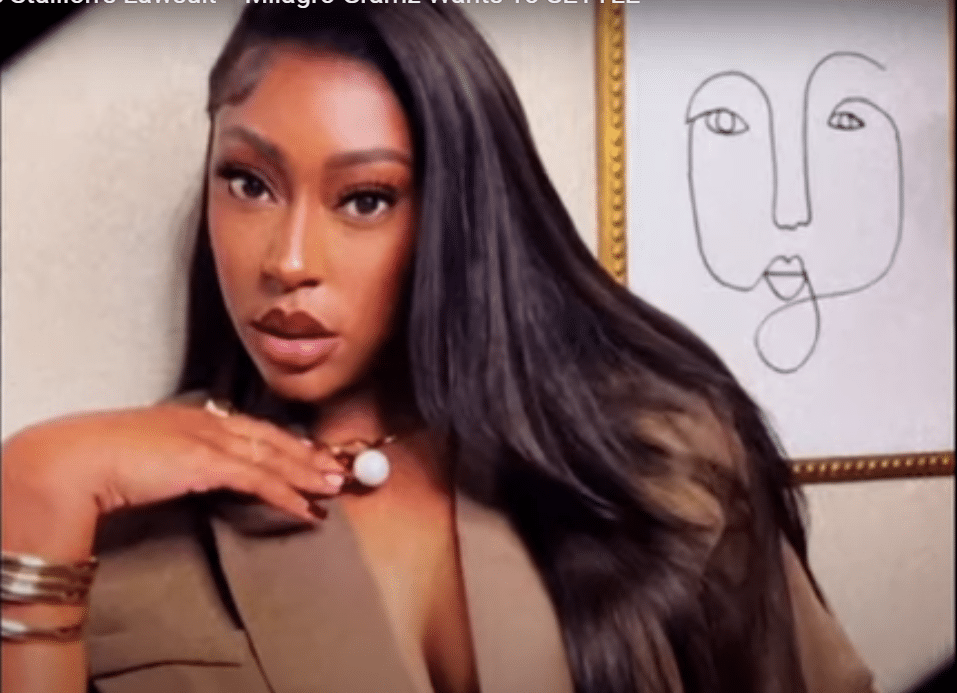Table of Contents
Social Media Sparks Controversy
Memphis rapper GloRilla caused a stir on the internet after re-sharing an Instagram story that used Tory Lanez’s song “Y.D.L.R.,” which seemed to suggest that there was some beef between her and Megan Thee Stallion. This quickly removed post was subject to media personality Milagro Gramz critique who blamed GloRilla for not practicing self-advocacy. The situation was dissected by Gramz in an Instagram Live video, which was widely shared through @LiveBitez, drawing even more attention. It was a common belief that Megan had unfollowed GloRilla, a belief that both artists never confirmed.
The occurrence has a significant meaning as it represents the delicate relationships that exist in hip hop, where small everyday actions on social media serve as the base for assumptions. GloRilla’s deletion of the post coincided with the onset of debates over pleading her case and her allegiance. This attention-grabbing event was happening precisely during Megan’s prolonged online conflicts caused by Tory Lanez’s legal case. Milagro Gramz launched a scathing critique during her live stream, calling GloRilla’s actions cowardly. “She’s acting like a punk,” Gramz stated, arguing that deleting the post implied guilt.

She criticized GloRilla’s desire to fit into elite social circles, claiming it compromised her authenticity. “She wants to feel like a pretty girl, part of the ‘in’ crowd,” Milagro Gramz said, suggesting this undermined GloRilla’s independence. The commentary sparked debates about performative friendships and the pressures female artists face to align with peers. Milagro Gramz remarks polarized audiences, with some agreeing that GloRilla’s people-pleasing tendencies were problematic, while others defended her right to navigate friendships privately. The backlash underscored how minor online actions are magnified in celebrity culture, where every post is dissected for hidden meaning.
Fans Defend Loyalty Gesture
Fans swiftly rallied to GloRilla’s defense, framing her post deletion as a gesture of respect for Megan. One supporter tweeted, “Real friends talk it out—she deleted it to avoid hurting Megan.” Some pointed out that GloRilla had a history of backing Megan, such as the “Wanna Be” project, and uniting in public during Megan’s court battles. Critics claimed that GloRilla’s loyalty was not a matter of the correct understanding of a repost and commented that it was too pressing to monitor the artists on social media platforms. The incident drew sharp lines between the practice of keeping public individuals accountable and maintaining their personal space in relationships undisturbed.
On the other hand, the proponents of GloRilla pointed out her constant support for female empowerment, depicting the whole event as a mistake instead of a breach of trust. The people who rose and gave their opinion in favor of GloRilla demonstrated the difficulties of being authentic in a world where publicity is put under a microscope. GloRilla addressed the backlash directly on X (formerly Twitter), dismissing the drama as baseless. “Ion internet sht—it was an innocent repost,” she wrote, clarifying there was no malice toward Megan.
Her statement aimed to quell rumors, reaffirming their friendship and downplaying the incident as a simple mistake. However, critics remained skeptical, dissecting her wording and timing. Supporters praised her transparency, arguing that casual posts shouldn’t warrant public crucifixion. The response underscored the double standards female artists face, where minor actions are often weaponized to fuel narratives of “beef” or disloyalty. GloRilla’s refusal to engage further signaled a desire to move past the controversy, though the episode lingered in fan discussions. Her handling of the situation reflected the tightrope artists walk between addressing drama and avoiding prolonged scrutiny.
Legal Battles Amplify Scrutiny
The scandal started with Megan Thee Stallion, who was in a new round of the legal war linked to Tory Lanez’s 2020 shooting case. Back in May, the rapper’s lawyer spoke out against the “fabricated stories” that Lanez’s fans were dispersing and who were even more harassing after it was known about his imprisonment. Her attorney, Alex Spiro, expressed to Billboard that the accusations are “foolish bullying,” besides confirming Megan’s no-victim-blaming position. This detail raised a question behind GloRilla’s post and whether the latter’s help in the music area with Lanez would have given it a connotation of the indirect support of the camp.
Megan’s personal struggle with online toxicity made it known that it is an obvious problem about the attitude of females in hip-hop, and where self-defense puts them in a spot where they are further attacked in return. The criss-cross of these incidents has shown the audience an example of how law cases and social life are barely distinguishable. The incident underscores the precarious dynamics of female solidarity in hip-hop, where public gestures are dissected for hidden meanings.
GloRilla’s attempt to casually share a song spiraled into a referendum on her loyalty, revealing how quickly minor missteps escalate in hyperconnected fandoms. Megan’s brief unfollowing of GloRilla—later reversed—highlighted the performative nature of social media interactions among celebrities. Fans and critics alike scrutinized every move, projecting narratives of rivalry or unity onto their actions. This environment forces artists to balance authenticity with calculated visibility, as even innocuous posts can trigger speculation. The episode serves as a reminder of the pressures women face to publicly align with peers while navigating private complexities, often sacrificing personal boundaries to maintain industry relationships.
Social Media’s Amplified Role
Social media’s role in amplifying conflicts cannot be overstated, as platforms like Instagram and X transform minor incidents into viral controversies. GloRilla’s deleted post and Megan’s unfollowing became trending topics within hours, fueled by influencers like Milagro Gramz dissecting the drama. The rapid increase in demand for constant access to artists’ lives by the audience reflects the voyeuristic view of fan culture. As a result, their public and private life balance becomes a big problem, and the artists have to self-censor not to be criticized. For GloRilla and Megan, whose careers thrive on authenticity, this creates a paradox: fans crave relatability but punish deviations from expected narratives.

The incident exemplifies how digital spaces amplify misunderstandings, turning private conversations into public spectacles with lasting reputational consequences. At the heart of the GloRilla-Megan controversy is the deeper issue with hip-hop culture where women are usually set out as competitors. The demand placed on female artists to always display unity erases the real life complexity of the relationships, such as conflicts and reconciliations. GloRilla is a case in point of the limitations of trying to operate within a sexist industry, which not only pushes you to be vulnerable but also to be invulnerable.
The situation with Megan and GloRilla shows how they experience the same difficulties that most women have with the issues of misogyny and accountability. Going forward, the whole incident becomes a call for more understanding of artists’ real personalities when they are not on social media and a non-acceptance of fan actions that are negative and raise dishonesty over dignity. To do otherwise, female rappers will still be torn between honesty and fear of being consumed in a light, which hardly rewards mistakes.



